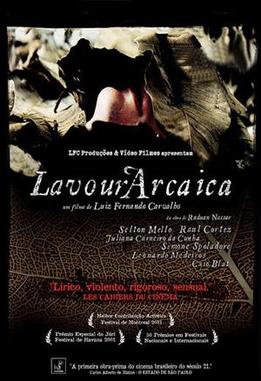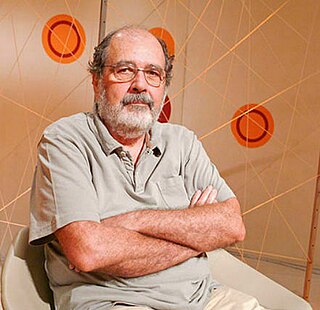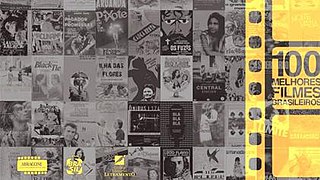
City of God is a 2002 Brazilian epic crime film directed by Fernando Meirelles and Kátia Lund. Bráulio Mantovani's script is adapted from the 1997 novel of the same name written by Paulo Lins, but the plot is also loosely based on real events. It depicts the growth of organized crime in the Cidade de Deus suburb of Rio de Janeiro, between the end of the 1960s and the beginning of the 1980s, with the film's closure depicting the war between the drug dealer Li'l Zé and vigilante-turned-criminal Knockout Ned. The tagline is "If you run, the beast catches you; if you stay, the beast eats you."

Arlette Pinheiro Esteves TorresONM, known by her stage name Fernanda Montenegro, is a Brazilian stage, television and film actress. Considered by many the greatest Brazilian actress of all time, she is often referred to as the grande dame of Brazilian theater, cinema, and performing arts. For her work in Central Station (1998), she became the first, and to date the only, Brazilian nominated for the Academy Award for Best Actress, as well as the first and only actress nominated for an Academy Award for a performance in a Portuguese language film. In addition, she was the first Brazilian to win the International Emmy in the category of Best Actress for her performance in Sweet Mother (2013).

Brazilian cinema was introduced early in the 20th century but took some time to consolidate itself as a popular form of entertainment. The film industry of Brazil has gone through periods of ups and downs, a reflection of its dependency on state funding and incentives.

To the Left of the Father is a 2001 Brazilian drama film produced, written, directed and edited by Luiz Fernando Carvalho, based on the novel of the same name by Raduan Nassar. The film follows a man who returns to his father's home after many years and falls in love with his sister. In 2015, the Brazilian Film Critics Association (Abraccine) placed To the Left of the Father among their list of 100 Greatest Brazilian Films of All Time.

Erasmo Carlos was a Brazilian singer and songwriter, most closely associated with his friend and longtime collaborator Roberto Carlos. Together, they created many chart hits including "É Proibido Fumar", "Sentado à beira do caminho", "Além do Horizonte", "Amigo" and "Festa de Arromba".
Pornochanchada is the name given to a genre of sex comedy films produced in Brazil that was popular from the late 1960s after popularity of commedia sexy all'italiana. By the 1980s, with the wide availability of hardcore pornography through clandestine video cassettes, the genre suffered a considerable decline. The name, combined pornô (porn) and chanchada, which itself combined comedy and erotica.

The Year My Parents Went on Vacation is a 2006 Brazilian drama film directed by Cao Hamburger. The screenplay, which took four years to be completed, was written by Hamburger, Adriana Falcão, Claudio Galperin, Anna Muylaert and Bráulio Mantovani. It won 36 awards in 18 film festivals where it competed.

Carlos Diegues, also known as Cacá Diegues, is a Brazilian film director. He was born in Maceió, Alagoas, and is best known as a member of the Cinema Novo movement. He is popularly known for his unconventional, yet intriguing film techniques among other film producers of the Cinema Novo movement. Diegues is also widely known for his dynamic use visuals, ideas, plots, themes, and other cinematic techniques. He incorporated many musical acts in his film as he favored musical pieces to be complementary of his ideas. Diegues remains very popular and is regarded as one of the most cinematic producers of his generation. Of the Cinema Novo directors, he would go on to produce films, plays, musicals and other forms of entertainment in Brazil.

Regina Maria Loureiro Barreto CaséOMC is a Brazilian actress, screenwriter, director, producer, and television presenter.
José Carlos Avellar was a Brazilian film critic and essayist.

Perfumed Ball is a 1996 Brazilian film directed by Lírio Ferreira and Paulo Caldas. Starring Duda Mamberti and Luiz Carlos Vasconcelos, it shows the history of how Benjamin Abrahão befriended Lampião, the leader of the Cangaço, and filmed his crimes — a feat the Brazilian army was not able to accomplish. It used footage taken in 1936 for Abrahão's 1959 film Lampião, o Rei do Cangaço.

Kleber Mendonça Filho is a Brazilian film director, screenwriter, producer, and critic.
João Penca e Seus Miquinhos Amestrados, commonly referred to as simply João Penca or J.P.M.A., were a Brazilian new wave band from Rio de Janeiro. Founded under the name Zoo, they were famous for their humorous, tongue-in-cheek lyrics filled with double entendres and innuendos which frequently parodied the tropes of 1950s rockabilly and 1960s surf music culture, and for their clothing heavily inspired by singers such as Elvis Presley and Chuck Berry.

Além da Alienação is the third studio album by Brazilian new wave band João Penca e Seus Miquinhos Amestrados. It was released in 1988 by RCA Records. Making a guest appearance is Virginie Boutaud of Metrô fame on the track "Sem Ilusões".

Sucesso do Inconsciente is the fourth studio album by Brazilian new wave band João Penca e Seus Miquinhos Amestrados. It was released in 1989 by independent label Esfinge.

Cem Anos de Rock n' Roll is the fifth and last studio album by Brazilian new wave band João Penca e Seus Miquinhos Amestrados. It was released in 1990 by Eldorado.

A Festa dos Micos is a compilation album by Brazilian new wave band João Penca e Seus Miquinhos Amestrados. It was released in 1993 by Leblon Records. It was the band's last release prior to their break-up one year later.

Events in the year 2016 in Brazil:

In 2015, the Brazilian Film Critics Association (Abraccine) published a list with the 100 best Brazilian films ever according to the votes of its members. This poll was the basis for a book named The 100 Best Brazilian Films, published in 2016. The idea of the ranking and the book was suggested by publisher Letramento, with whom Abraccine and television network Canal Brasil co-released the book. The ranking was done based on individual lists done by Abraccine's 100 critics, who initially mentioned 379 films. The full list was first made available to the public on 26 November 2015, and the book was released on 1 September 2016.

The Red Light Bandit is a 1968 Brazilian crime film directed by Rogério Sganzerla, inspired by the crimes of the famous real-life robber João Acácio Pereira da Costa, nicknamed the "Red Light Bandit". The film is regarded as a classic work of Cinema Marginal, the Brazilian underground filmmaking movement of the 1960s. Sganzerla was about 22 years old when he directed it.
















